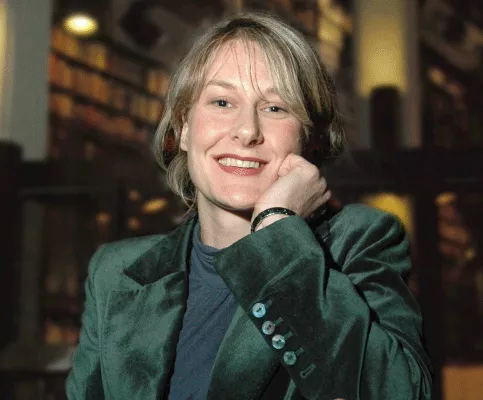Alexandra Gillespie


A good portion of Alexandra Gillespie’s world is immersed in the past. For the assistant professor of English, whose main focus is early book culture and the literary period between 1300 and 1600, even some of her pastimes originate in an earlier time.
“Despite being an English professor, I do read novels,” says Gillespie with a laugh. “I especially like 19th- and early 20th-century detective fiction.” Her favourite DVDs include The Barchester Chronicles, based on books by Anthony Trollope, and Deadwood, a drama-western series set in 1876 in the United States. She also enjoys listening to jazz and swing music from the early 20th-century. These activities all serve a dual purpose: they allow Gillespie a bit of a break from her extensive Middle English research, and they also provide an escape from wintry weather. As a native of New Zealand, Gillespie is still adjusting to the colder climes of Canada since arriving here in 2004. “In the summer you’ll find me cycling along Queen Street, or out listening to music, but in the winter I tend to stay at home,” says Gillespie. “It’s too cold.”
Gillespie’s latest publication, Print Culture and the Medieval Author, examines hundreds of early printed books and their late-medieval analogues, and she will soon be working on editing The Production of Books in England 1350-1530. This book will contain a collection of essays from various contributors that she and her collaborator hopes will serve as a starting resource point for students if they are interested in exploring medieval book history, literary books and English-literary manuscripts, but don’t really know where to begin. Making early book history more accessible seems to be a personal undertaking for Gillespie, who takes students each term on a tour of U of T’s Thomas Fisher Rare Book Library – one of her favourite places to do research – on the St. George campus.

Her current research concentrates on the period of transition between manuscript and print. The first books were printed in England in 1476 by William Caxton (although there were books that were printed in the 1450s in other European countries and imported to England), and Gillespie focuses on the 100 years prior to the printing of these books and the 100 years after the printing press emerged. “The transition between manuscript and print at the end of the Middle Ages doesn’t result in a particularly different oral culture,” says Gillespie, who explains that at that time there were two different models of reading: silent reading and reading aloud. “After printing you still use the oral – reading books aloud – as a really important mode of transmission, partly because there’s not much evidence that printing actually changed the cost of books for quite a long period.”
However Gillespie is still working out how significantly print changed the way people read books, other than the fact that it made texts mass produced and slightly more accessible. She compares the advent of printing to the current electronic shift taking place today, with books available online and people downloading them onto their iPods. “I would say that printing probably did change access, but not as much as we tend to think,” says Gillespie. “And I think there has been a massive change in access with the computer, but not as much as we think – or not in quite the way that we think.” She feels that just as printing didn’t necessarily make books accessible because some people couldn’t afford to purchase them, not everyone has access to computers or the Internet.
When she started studying at Oxford, Gillespie was torn between focusing on Chaucer and Spenser. However, during one of her first trips to the library, she found a manuscript of “tales of knights and ladies” that sealed her fate. “From that moment, I just knew,” says Gillespie. “It sounds like a religious conversion or a falling in love, and it was a little bit like that: it was thrilling and exciting and it hasn’t gone away.” She completed her doctorate at Oxford, keeping in mind that successful academics are slightly obsessed with their subject matter, and as a scholar she should pursue something that would interest her enough to work on it every day of her career. “Even though book history has become very fashionable recently, I will keep doing it long after it’s not fashionable because I love it,” enthuses Gillespie.

When asked about the value in this kind of scholarship, Gillespie talks about studying something, not necessarily because it is going to bring about a significant change in the way the world perceives, but because it is important to devote time and thought to endeavours that we personally find fascinating and exciting. “It’s those moments when we stand away from the way in which our culture works, and think about it, because doing so is interesting, for no other reason other than it’s interesting,” says Gillespie.
She feels it is important to examine the way past cultures lived, and that it might teach us something about how our society functions today, but that does not provide the full motivation for the kind of research that she does. “The period that I’m talking about can unsettle some of our assumptions about what the past was like,” says Gillespie. “Challenging those assumptions is important, but there’s also just a sheer joy of discovery and of intellectual inquiry when you sit down with a book that was made in the 1400s, figuring out how it was bound together, how it was stitched together, how it’s covered in leather, and looking at the way that it was illustrated, the layout of the page, contemplating the history of the book, why someone might have wanted to make it in the first place, and what it might have meant to them. There’s just a joy in that.”



